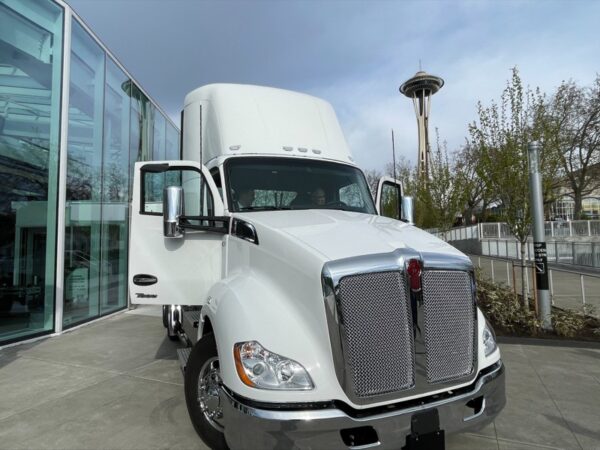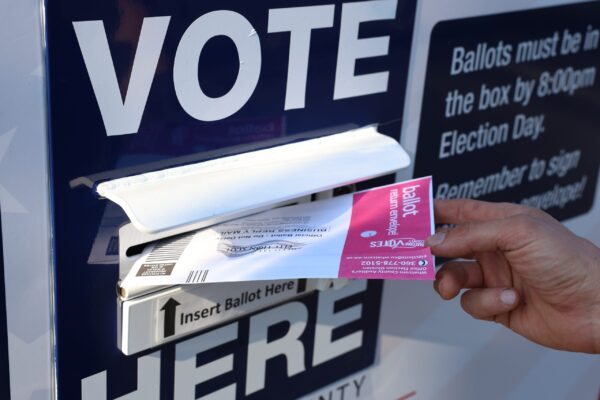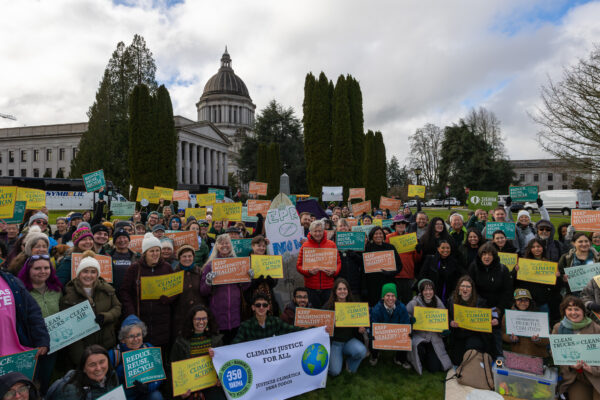Voters in Washington state are talking about solutions to climate change—not whether it’s real. That is the right conversation and we respect the very hard work that climate-conscious voters and advocates have done to advance the conversation. We intend to build on that momentum.
Washington Environmental Council supports a climate policy (see here) that will be effective at fighting climate change as fast and as thoughtfully as the crisis requires.
An effective policy requires three things.
- It must cut pollution.
- It must re-invest revenues in clean energy solutions like wind and solar power that ensure the health and well-being of future generations.
- And it must invest in the communities and workers who are hardest hit by the effects of pollution, climate change, and the transition to a clean energy future.
We are progressive pragmatists, but we know that the urgency of the crisis—and the difficulty of repairing policies after the fact—mean that it is critical to get the solution right the first time. It’s too important to get wrong.
For that reason, we will bring a measure to the legislature in January with a broad coalition of support. That broad coalition is necessary to overcome the political power of the fossil fuel industry and others opposed to taking positive steps towards a clean energy future.
As we do that we must consider the economic realities of our society and the pressing need to invest in clean energy, our forests, and our waters, while enhancing our way of life.
In the movement for climate justice, like all major political movements in this country, the path to progress is rarely straight and simple. Good people can and do disagree on matters of policy and strategy and, while we made mistakes along the way, we stand by our policy and the political analysis on which it was built.
We believe in a state and a country that run on clean, renewable energy and that are racially just. To get there, we’re going to have to go together. That means including the people who will be most affected by the transition and all of those who have a stake in our shared future. Working in a broad coalition is the only way to win.
We are confident in the path ahead. We look forward to working with all communities, including I-732’s supporters, to put in place a solution that works for Washington and can serve as a strong example for other states and countries to follow.
Thank you for your support.
ORIGINAL STATEMENT | October 14, 2016
Initiative Measure 732 – Voting Recommendation: No
After careful consideration and engagement across a wide range of communities and groups who will be affected by climate change, Washington Environmental Council has made the difficult decision that we cannot support Initiative 732 and recommend a no vote (see below for a list of organizations also not supporting). We have been working to combat climate change for over a decade, and we do not come to this decision lightly.
While we applaud the motivations and hard work of I-732 supporters and volunteers, in policy decisions like this, details matter. WEC supports putting a price on carbon pollution because it is a fundamental driver for the transition to clean energy, but it’s critical that we get climate policy in Washington right the first time. All climate policies are not equal. History shows that a “pass it now, fix it later” approach doesn’t work, especially with the current polarizing political climate.
We take seriously our responsibility to advocate for the right carbon pricing system and we believe I-732 is flawed for a number of reasons:
- It relies solely on economic signals to drive down emissions, which allows all polluters to pay to continue to pollute instead of reducing emissions. Without a carbon cap, we can’t ensure that we will achieve the pollution reductions that are required in state law, but are currently unenforced.
- To reduce carbon emissions quickly, we must not only decrease our use of fossil fuels, we must also rapidly increase our use of clean energy, including solar and wind power and the electrification of transportation. This is the only way for us to transition to a low-carbon economy and significantly decrease our use of fossil fuels. Unfortunately, 732 devotes the revenue created by the initiative on tax cuts, instead of strategically reinvesting in clean energy to accelerate our transition away from fossil fuels and fund an equitable transition for workers and disadvantaged communities.
- Despite the initiative’s intent to be revenue neutral, the state Office of Financial Management has analyzed the policy and found that enacting it would create a $797 million hole over the next three biennia in the already insufficient state budget. That’s over $130 million every year, at a time when the state is struggling to pay for vital services and public education. This budget hole would increase burdens on vulnerable populations, and reduce dollars for enforcing existing environmental laws, not to mention preventing needed investments in transitioning to clean energy.
We have learned from past attempts in state and around the world, that in order to pass transformational carbon pollution policy and then defend against the oil industry’s attempts to repeal the law we must work with a broad, politically-powerful coalition. Washington Conservation Voters and Washington Environmental Council are part of a statewide coalition of leaders and grassroots activists representing communities of color, health organizations, labor groups, businesses, the faith community and others who are working together to develop, pass and defend a policy that will stand for the long haul in Washington and serve as an example for other states to follow.
Washington can—and must—lead on climate action. Let’s get it right with policy that reduces emissions and reinvests in the clean energy that will make our state safer, healthier and more prosperous. A broad coalition can achieve such policy, and sustain it over time. Washington Environmental Council is committed to doing so and hope you will join us in this transformational work. Learn more about our proposed policy here.
The following organizations also have positions that range from “do not support” to “oppose” on I-732.
- Washington Conservation Voters
- Climate Solutions
- Sierra Club
- Fuse WA
- Children’s Alliance
- Got Green?
- OneAmerica
- 350Seattle.org
- Puget Sound Sage
- United Food & Commercial Workers (UFCW) 21
- Seattle Audubon
- Progreso Latino
- Front and Centered
- Washington State Labor Council, AFL-CIO



